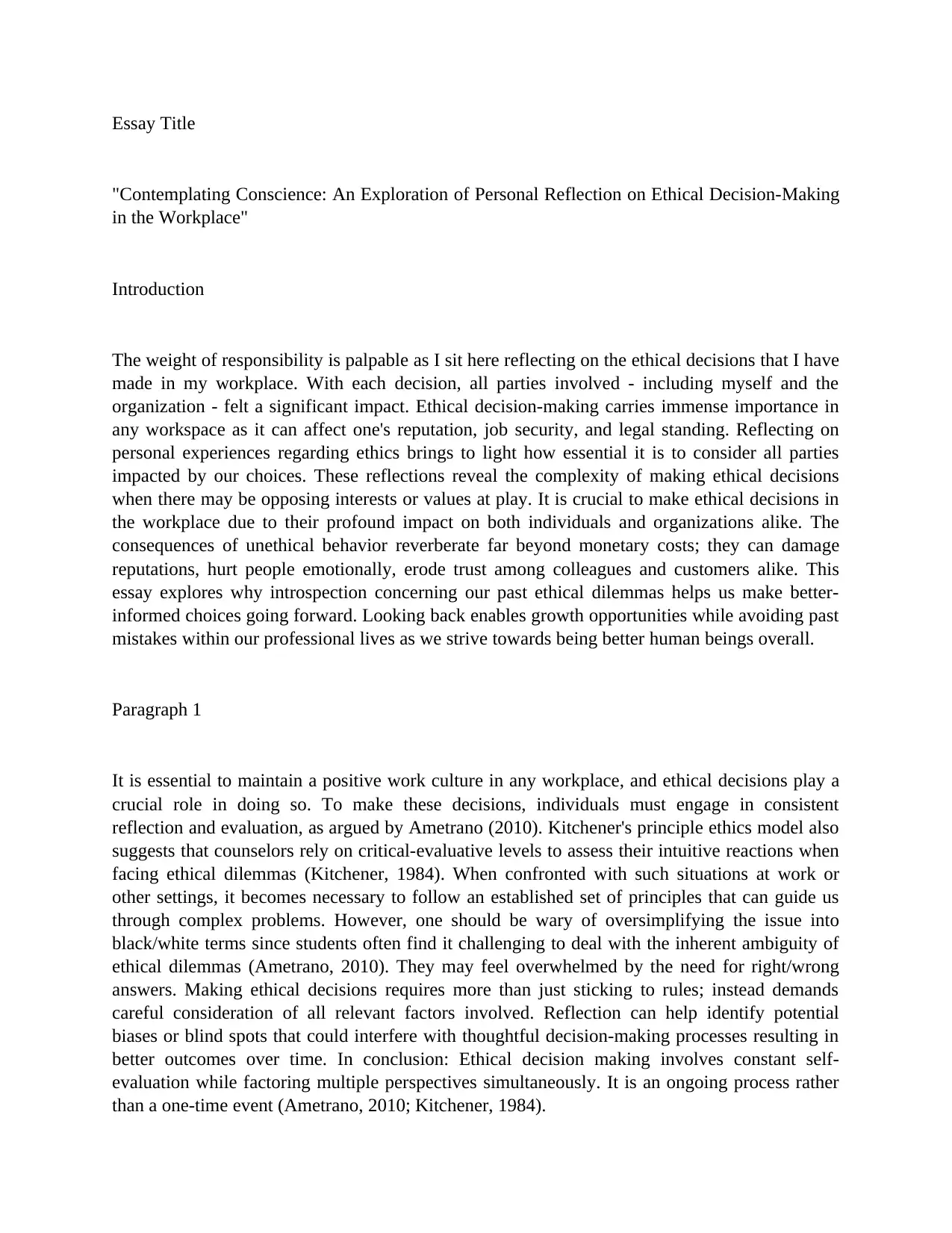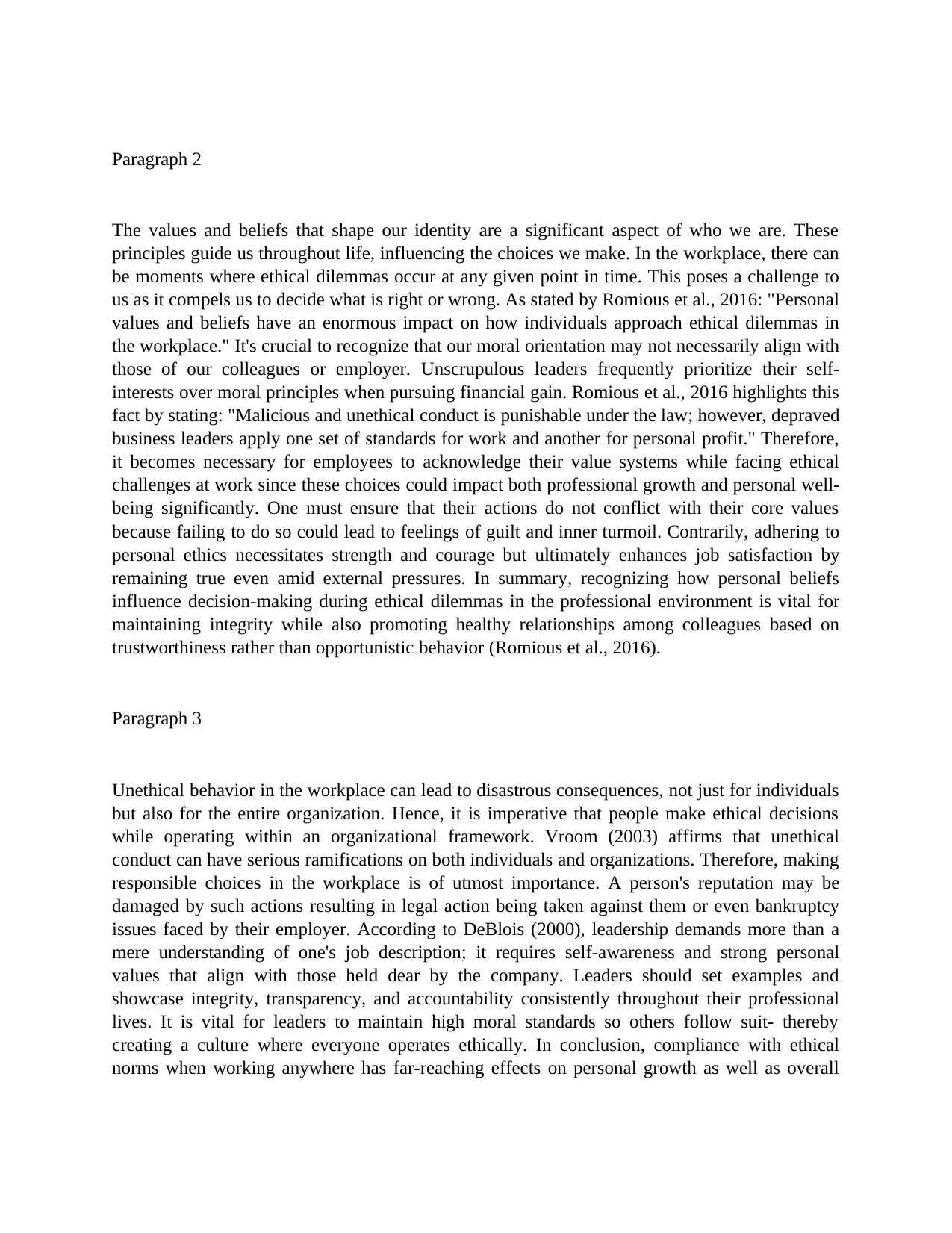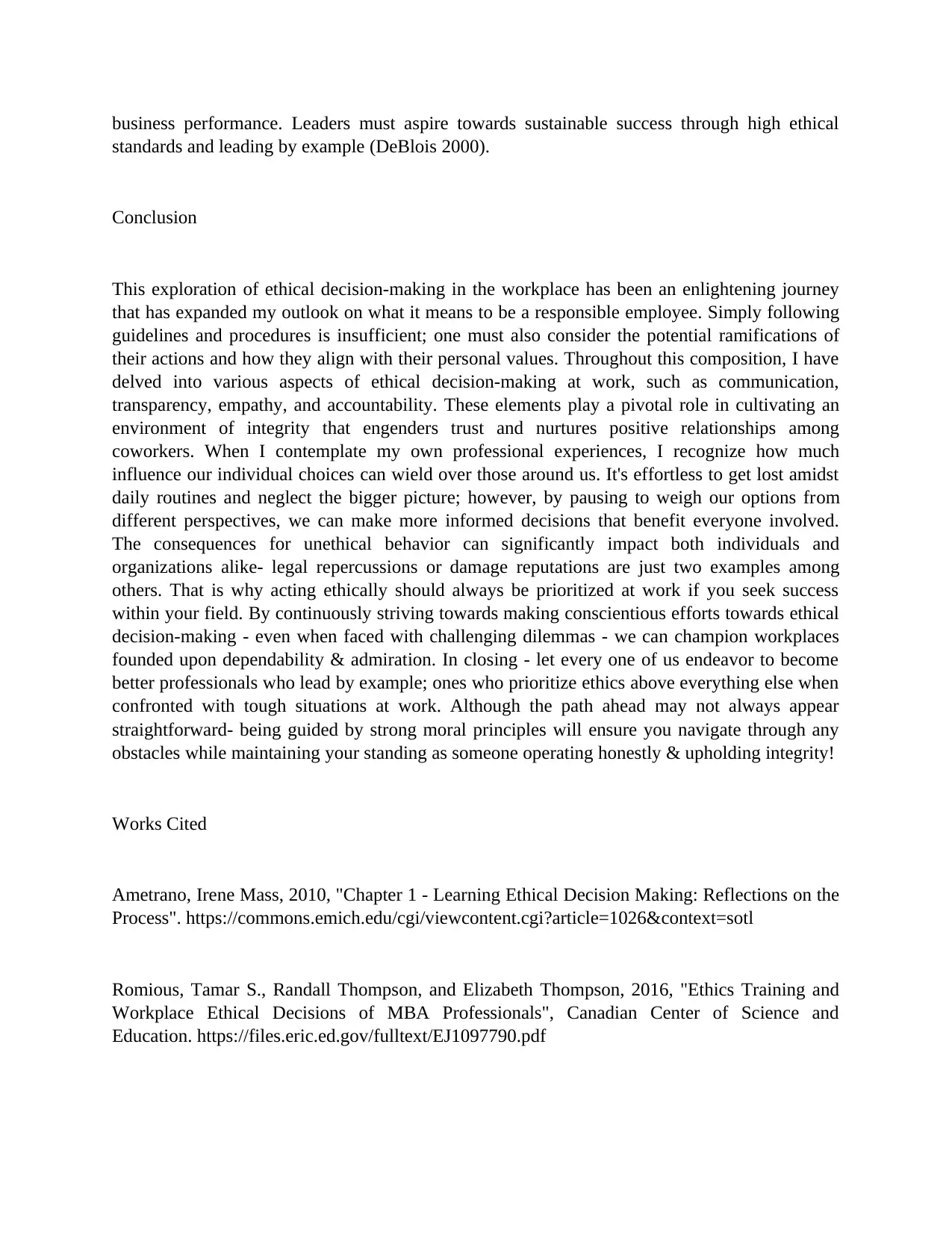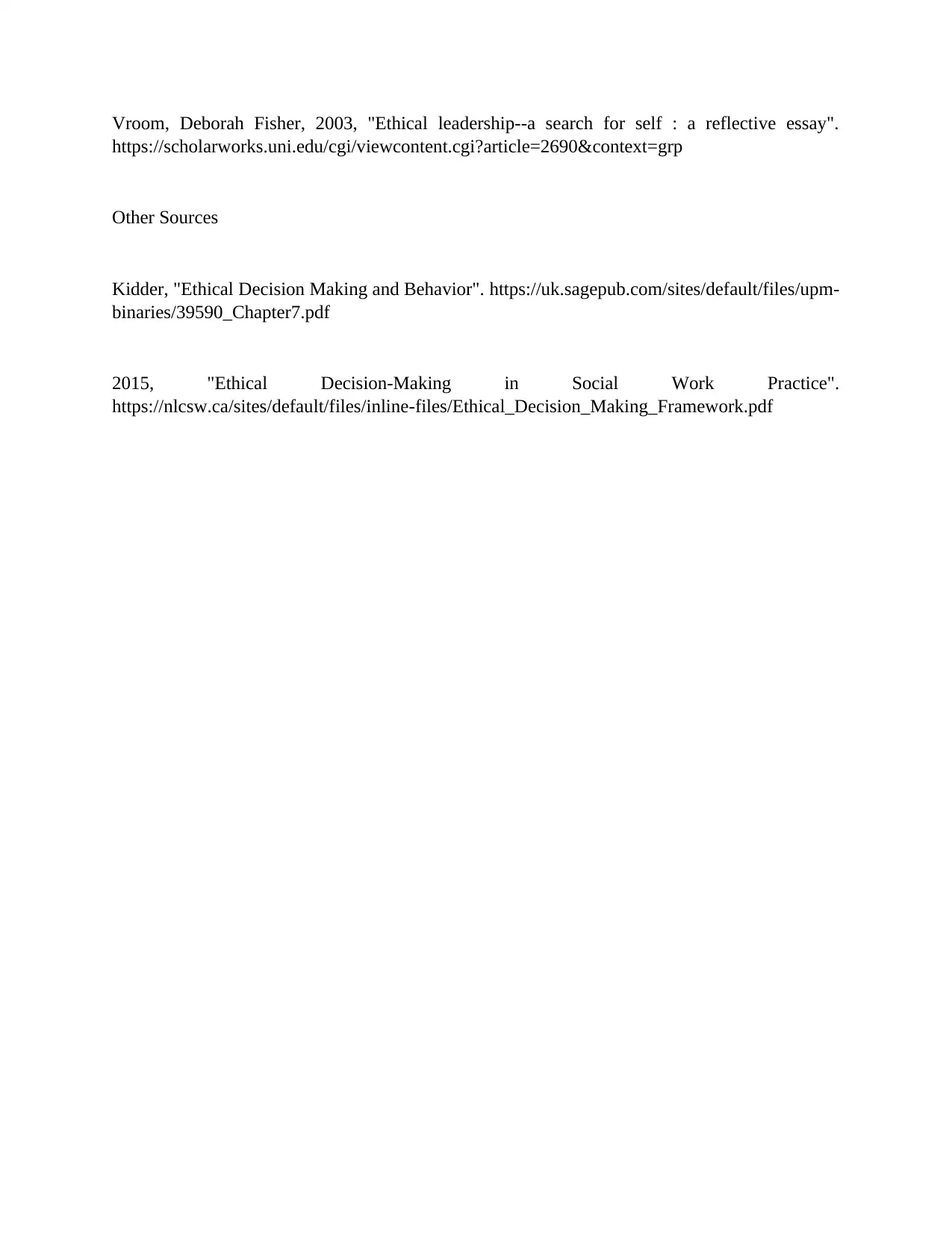Personal Reflection: Ethical Decision-Making in the Workplace Essay
VerifiedAdded on 2023/06/19
|4
|1393
|492
Essay
AI Summary
This essay explores the importance of ethical decision-making in the workplace through personal reflection. It emphasizes how ethical choices impact individuals, organizations, and overall work culture. The essay discusses the role of personal values and beliefs in navigating ethical dilemmas, highlighting the potential conflicts between personal ethics and organizational interests. It also addresses the consequences of unethical behavior and the importance of ethical leadership in fostering a culture of integrity. The author reflects on their own professional experiences, emphasizing the need for communication, transparency, empathy, and accountability in ethical decision-making. The essay concludes by advocating for continuous self-evaluation and a commitment to ethical principles to promote trustworthy and admirable workplaces. Desklib provides access to similar essays and study tools for students.

Essay Title
"Contemplating Conscience: An Exploration of Personal Reflection on Ethical Decision-Making
in the Workplace"
Introduction
The weight of responsibility is palpable as I sit here reflecting on the ethical decisions that I have
made in my workplace. With each decision, all parties involved - including myself and the
organization - felt a significant impact. Ethical decision-making carries immense importance in
any workspace as it can affect one's reputation, job security, and legal standing. Reflecting on
personal experiences regarding ethics brings to light how essential it is to consider all parties
impacted by our choices. These reflections reveal the complexity of making ethical decisions
when there may be opposing interests or values at play. It is crucial to make ethical decisions in
the workplace due to their profound impact on both individuals and organizations alike. The
consequences of unethical behavior reverberate far beyond monetary costs; they can damage
reputations, hurt people emotionally, erode trust among colleagues and customers alike. This
essay explores why introspection concerning our past ethical dilemmas helps us make better-
informed choices going forward. Looking back enables growth opportunities while avoiding past
mistakes within our professional lives as we strive towards being better human beings overall.
Paragraph 1
It is essential to maintain a positive work culture in any workplace, and ethical decisions play a
crucial role in doing so. To make these decisions, individuals must engage in consistent
reflection and evaluation, as argued by Ametrano (2010). Kitchener's principle ethics model also
suggests that counselors rely on critical-evaluative levels to assess their intuitive reactions when
facing ethical dilemmas (Kitchener, 1984). When confronted with such situations at work or
other settings, it becomes necessary to follow an established set of principles that can guide us
through complex problems. However, one should be wary of oversimplifying the issue into
black/white terms since students often find it challenging to deal with the inherent ambiguity of
ethical dilemmas (Ametrano, 2010). They may feel overwhelmed by the need for right/wrong
answers. Making ethical decisions requires more than just sticking to rules; instead demands
careful consideration of all relevant factors involved. Reflection can help identify potential
biases or blind spots that could interfere with thoughtful decision-making processes resulting in
better outcomes over time. In conclusion: Ethical decision making involves constant self-
evaluation while factoring multiple perspectives simultaneously. It is an ongoing process rather
than a one-time event (Ametrano, 2010; Kitchener, 1984).
"Contemplating Conscience: An Exploration of Personal Reflection on Ethical Decision-Making
in the Workplace"
Introduction
The weight of responsibility is palpable as I sit here reflecting on the ethical decisions that I have
made in my workplace. With each decision, all parties involved - including myself and the
organization - felt a significant impact. Ethical decision-making carries immense importance in
any workspace as it can affect one's reputation, job security, and legal standing. Reflecting on
personal experiences regarding ethics brings to light how essential it is to consider all parties
impacted by our choices. These reflections reveal the complexity of making ethical decisions
when there may be opposing interests or values at play. It is crucial to make ethical decisions in
the workplace due to their profound impact on both individuals and organizations alike. The
consequences of unethical behavior reverberate far beyond monetary costs; they can damage
reputations, hurt people emotionally, erode trust among colleagues and customers alike. This
essay explores why introspection concerning our past ethical dilemmas helps us make better-
informed choices going forward. Looking back enables growth opportunities while avoiding past
mistakes within our professional lives as we strive towards being better human beings overall.
Paragraph 1
It is essential to maintain a positive work culture in any workplace, and ethical decisions play a
crucial role in doing so. To make these decisions, individuals must engage in consistent
reflection and evaluation, as argued by Ametrano (2010). Kitchener's principle ethics model also
suggests that counselors rely on critical-evaluative levels to assess their intuitive reactions when
facing ethical dilemmas (Kitchener, 1984). When confronted with such situations at work or
other settings, it becomes necessary to follow an established set of principles that can guide us
through complex problems. However, one should be wary of oversimplifying the issue into
black/white terms since students often find it challenging to deal with the inherent ambiguity of
ethical dilemmas (Ametrano, 2010). They may feel overwhelmed by the need for right/wrong
answers. Making ethical decisions requires more than just sticking to rules; instead demands
careful consideration of all relevant factors involved. Reflection can help identify potential
biases or blind spots that could interfere with thoughtful decision-making processes resulting in
better outcomes over time. In conclusion: Ethical decision making involves constant self-
evaluation while factoring multiple perspectives simultaneously. It is an ongoing process rather
than a one-time event (Ametrano, 2010; Kitchener, 1984).
Paraphrase This Document
Need a fresh take? Get an instant paraphrase of this document with our AI Paraphraser

Paragraph 2
The values and beliefs that shape our identity are a significant aspect of who we are. These
principles guide us throughout life, influencing the choices we make. In the workplace, there can
be moments where ethical dilemmas occur at any given point in time. This poses a challenge to
us as it compels us to decide what is right or wrong. As stated by Romious et al., 2016: "Personal
values and beliefs have an enormous impact on how individuals approach ethical dilemmas in
the workplace." It's crucial to recognize that our moral orientation may not necessarily align with
those of our colleagues or employer. Unscrupulous leaders frequently prioritize their self-
interests over moral principles when pursuing financial gain. Romious et al., 2016 highlights this
fact by stating: "Malicious and unethical conduct is punishable under the law; however, depraved
business leaders apply one set of standards for work and another for personal profit." Therefore,
it becomes necessary for employees to acknowledge their value systems while facing ethical
challenges at work since these choices could impact both professional growth and personal well-
being significantly. One must ensure that their actions do not conflict with their core values
because failing to do so could lead to feelings of guilt and inner turmoil. Contrarily, adhering to
personal ethics necessitates strength and courage but ultimately enhances job satisfaction by
remaining true even amid external pressures. In summary, recognizing how personal beliefs
influence decision-making during ethical dilemmas in the professional environment is vital for
maintaining integrity while also promoting healthy relationships among colleagues based on
trustworthiness rather than opportunistic behavior (Romious et al., 2016).
Paragraph 3
Unethical behavior in the workplace can lead to disastrous consequences, not just for individuals
but also for the entire organization. Hence, it is imperative that people make ethical decisions
while operating within an organizational framework. Vroom (2003) affirms that unethical
conduct can have serious ramifications on both individuals and organizations. Therefore, making
responsible choices in the workplace is of utmost importance. A person's reputation may be
damaged by such actions resulting in legal action being taken against them or even bankruptcy
issues faced by their employer. According to DeBlois (2000), leadership demands more than a
mere understanding of one's job description; it requires self-awareness and strong personal
values that align with those held dear by the company. Leaders should set examples and
showcase integrity, transparency, and accountability consistently throughout their professional
lives. It is vital for leaders to maintain high moral standards so others follow suit- thereby
creating a culture where everyone operates ethically. In conclusion, compliance with ethical
norms when working anywhere has far-reaching effects on personal growth as well as overall
The values and beliefs that shape our identity are a significant aspect of who we are. These
principles guide us throughout life, influencing the choices we make. In the workplace, there can
be moments where ethical dilemmas occur at any given point in time. This poses a challenge to
us as it compels us to decide what is right or wrong. As stated by Romious et al., 2016: "Personal
values and beliefs have an enormous impact on how individuals approach ethical dilemmas in
the workplace." It's crucial to recognize that our moral orientation may not necessarily align with
those of our colleagues or employer. Unscrupulous leaders frequently prioritize their self-
interests over moral principles when pursuing financial gain. Romious et al., 2016 highlights this
fact by stating: "Malicious and unethical conduct is punishable under the law; however, depraved
business leaders apply one set of standards for work and another for personal profit." Therefore,
it becomes necessary for employees to acknowledge their value systems while facing ethical
challenges at work since these choices could impact both professional growth and personal well-
being significantly. One must ensure that their actions do not conflict with their core values
because failing to do so could lead to feelings of guilt and inner turmoil. Contrarily, adhering to
personal ethics necessitates strength and courage but ultimately enhances job satisfaction by
remaining true even amid external pressures. In summary, recognizing how personal beliefs
influence decision-making during ethical dilemmas in the professional environment is vital for
maintaining integrity while also promoting healthy relationships among colleagues based on
trustworthiness rather than opportunistic behavior (Romious et al., 2016).
Paragraph 3
Unethical behavior in the workplace can lead to disastrous consequences, not just for individuals
but also for the entire organization. Hence, it is imperative that people make ethical decisions
while operating within an organizational framework. Vroom (2003) affirms that unethical
conduct can have serious ramifications on both individuals and organizations. Therefore, making
responsible choices in the workplace is of utmost importance. A person's reputation may be
damaged by such actions resulting in legal action being taken against them or even bankruptcy
issues faced by their employer. According to DeBlois (2000), leadership demands more than a
mere understanding of one's job description; it requires self-awareness and strong personal
values that align with those held dear by the company. Leaders should set examples and
showcase integrity, transparency, and accountability consistently throughout their professional
lives. It is vital for leaders to maintain high moral standards so others follow suit- thereby
creating a culture where everyone operates ethically. In conclusion, compliance with ethical
norms when working anywhere has far-reaching effects on personal growth as well as overall

business performance. Leaders must aspire towards sustainable success through high ethical
standards and leading by example (DeBlois 2000).
Conclusion
This exploration of ethical decision-making in the workplace has been an enlightening journey
that has expanded my outlook on what it means to be a responsible employee. Simply following
guidelines and procedures is insufficient; one must also consider the potential ramifications of
their actions and how they align with their personal values. Throughout this composition, I have
delved into various aspects of ethical decision-making at work, such as communication,
transparency, empathy, and accountability. These elements play a pivotal role in cultivating an
environment of integrity that engenders trust and nurtures positive relationships among
coworkers. When I contemplate my own professional experiences, I recognize how much
influence our individual choices can wield over those around us. It's effortless to get lost amidst
daily routines and neglect the bigger picture; however, by pausing to weigh our options from
different perspectives, we can make more informed decisions that benefit everyone involved.
The consequences for unethical behavior can significantly impact both individuals and
organizations alike- legal repercussions or damage reputations are just two examples among
others. That is why acting ethically should always be prioritized at work if you seek success
within your field. By continuously striving towards making conscientious efforts towards ethical
decision-making - even when faced with challenging dilemmas - we can champion workplaces
founded upon dependability & admiration. In closing - let every one of us endeavor to become
better professionals who lead by example; ones who prioritize ethics above everything else when
confronted with tough situations at work. Although the path ahead may not always appear
straightforward- being guided by strong moral principles will ensure you navigate through any
obstacles while maintaining your standing as someone operating honestly & upholding integrity!
Works Cited
Ametrano, Irene Mass, 2010, "Chapter 1 - Learning Ethical Decision Making: Reflections on the
Process". https://commons.emich.edu/cgi/viewcontent.cgi?article=1026&context=sotl
Romious, Tamar S., Randall Thompson, and Elizabeth Thompson, 2016, "Ethics Training and
Workplace Ethical Decisions of MBA Professionals", Canadian Center of Science and
Education. https://files.eric.ed.gov/fulltext/EJ1097790.pdf
standards and leading by example (DeBlois 2000).
Conclusion
This exploration of ethical decision-making in the workplace has been an enlightening journey
that has expanded my outlook on what it means to be a responsible employee. Simply following
guidelines and procedures is insufficient; one must also consider the potential ramifications of
their actions and how they align with their personal values. Throughout this composition, I have
delved into various aspects of ethical decision-making at work, such as communication,
transparency, empathy, and accountability. These elements play a pivotal role in cultivating an
environment of integrity that engenders trust and nurtures positive relationships among
coworkers. When I contemplate my own professional experiences, I recognize how much
influence our individual choices can wield over those around us. It's effortless to get lost amidst
daily routines and neglect the bigger picture; however, by pausing to weigh our options from
different perspectives, we can make more informed decisions that benefit everyone involved.
The consequences for unethical behavior can significantly impact both individuals and
organizations alike- legal repercussions or damage reputations are just two examples among
others. That is why acting ethically should always be prioritized at work if you seek success
within your field. By continuously striving towards making conscientious efforts towards ethical
decision-making - even when faced with challenging dilemmas - we can champion workplaces
founded upon dependability & admiration. In closing - let every one of us endeavor to become
better professionals who lead by example; ones who prioritize ethics above everything else when
confronted with tough situations at work. Although the path ahead may not always appear
straightforward- being guided by strong moral principles will ensure you navigate through any
obstacles while maintaining your standing as someone operating honestly & upholding integrity!
Works Cited
Ametrano, Irene Mass, 2010, "Chapter 1 - Learning Ethical Decision Making: Reflections on the
Process". https://commons.emich.edu/cgi/viewcontent.cgi?article=1026&context=sotl
Romious, Tamar S., Randall Thompson, and Elizabeth Thompson, 2016, "Ethics Training and
Workplace Ethical Decisions of MBA Professionals", Canadian Center of Science and
Education. https://files.eric.ed.gov/fulltext/EJ1097790.pdf
⊘ This is a preview!⊘
Do you want full access?
Subscribe today to unlock all pages.

Trusted by 1+ million students worldwide

Vroom, Deborah Fisher, 2003, "Ethical leadership--a search for self : a reflective essay".
https://scholarworks.uni.edu/cgi/viewcontent.cgi?article=2690&context=grp
Other Sources
Kidder, "Ethical Decision Making and Behavior". https://uk.sagepub.com/sites/default/files/upm-
binaries/39590_Chapter7.pdf
2015, "Ethical Decision-Making in Social Work Practice".
https://nlcsw.ca/sites/default/files/inline-files/Ethical_Decision_Making_Framework.pdf
https://scholarworks.uni.edu/cgi/viewcontent.cgi?article=2690&context=grp
Other Sources
Kidder, "Ethical Decision Making and Behavior". https://uk.sagepub.com/sites/default/files/upm-
binaries/39590_Chapter7.pdf
2015, "Ethical Decision-Making in Social Work Practice".
https://nlcsw.ca/sites/default/files/inline-files/Ethical_Decision_Making_Framework.pdf
1 out of 4
Related Documents
Your All-in-One AI-Powered Toolkit for Academic Success.
+13062052269
info@desklib.com
Available 24*7 on WhatsApp / Email
![[object Object]](/_next/static/media/star-bottom.7253800d.svg)
Unlock your academic potential
Copyright © 2020–2026 A2Z Services. All Rights Reserved. Developed and managed by ZUCOL.




